A follow up to my previous post, “What Fresh Hell is This? Same Old Same Old.”
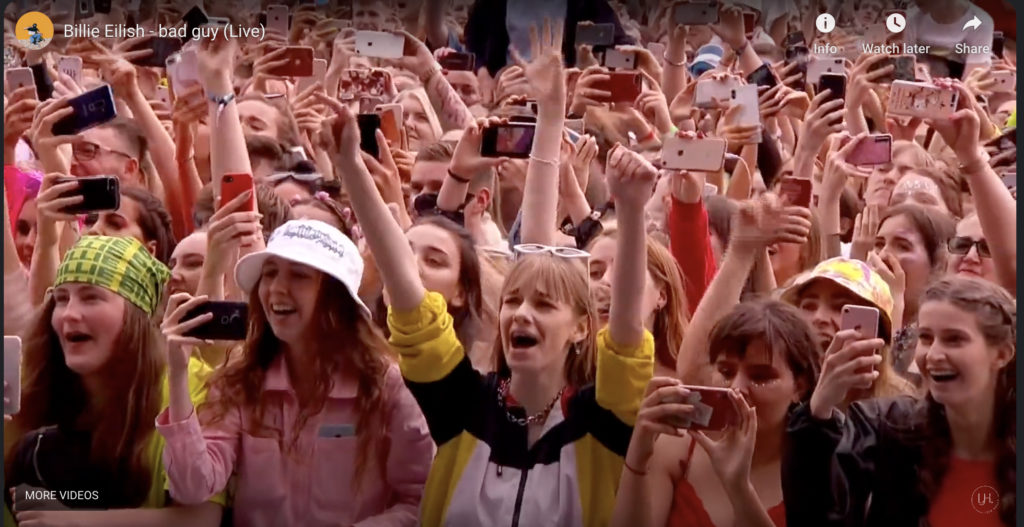
I doubt she’ll ever read this.
And if she does, I’d like to think that would be a good thing.
As not only a logical feminist, but also, through the wisdoms gleaned from logic, a fierce one, I discovered recently that a young woman, a teenager whom I am very close to, embodies my worst nightmare.
I am a survivor and, what I designate in my book Victim: A Feminist Manifesto from a Fierce Survivor, also a victim because: “the bodies of rape victims stand as accusations. Our scarred, vibrant beings as memorials.”[1] With a memorial, a never forgetting, comes memory; memory is knowledge and with knowledge comes knowing what is going on; by honoring our scars,[2] victim/survivors know not only in our minds, but deep within or bodies. The inevitable scars of surviving violence are legacies of trauma. And, paradoxically, never forgetting the sources of our trauma is a good thing because our awareness can help change the pathology of a culture built with exploitation that creates a generation of young women who could be described as voluntary victims.
How did I find out about this nightmare?
Well, I have a TikTok account as “The Logical Feminist.” I haven’t used it much. Only three or four posts. As you will know if you use social media to try and effectively share a message that extends beyond your personal life, it’s tough to keep up with all of the posting not to mention actually creating the projects that you will post about! That said, it’s on my extensive list to get on the TikTok and get Logical Feminism more extensively out into the world and help stop this nightmare backlash.
Every now and then when I am walking with my phone in my pocket, my TikTok turns on. I have only about five friends and every time the TikTok comes on and startles me out of some peaceful state, it’s her.
The first time it happened, I didn’t recognize her at first. She was lip-syncing to a song insulting other women, internalized sexism blasting from this insolent and, dare I say, lethally ignorant, young woman. Her eyelids heavy with hyper-feminine, excessive black lashes, push-up bra cleavage, her beautiful so-recently-still-a-girl face pouting “I’m more fuckable than she is.” My ire flared instantly and I was just about to comment “You’re an idiot,” when I saw her name and recognized her beneath all of the horror I was seconds away from lashing out at. I felt like I was going to puke; rage, panic and heartbreak momentarily darkened all hope and, amidst the gains a lot of women have made at least in the so-called first world, I thought: how the hell did this happen? This toxic backlash has to stop.
She’s sixteen now. When she was twelve or so she told me all she wanted was to be ‘cool.’ I thought “Oh No … here it comes ….” But, even though I have been studying and writing about sexual violence, feminist backlash and internalized sexism for decades, I never imagined how bad it could get.
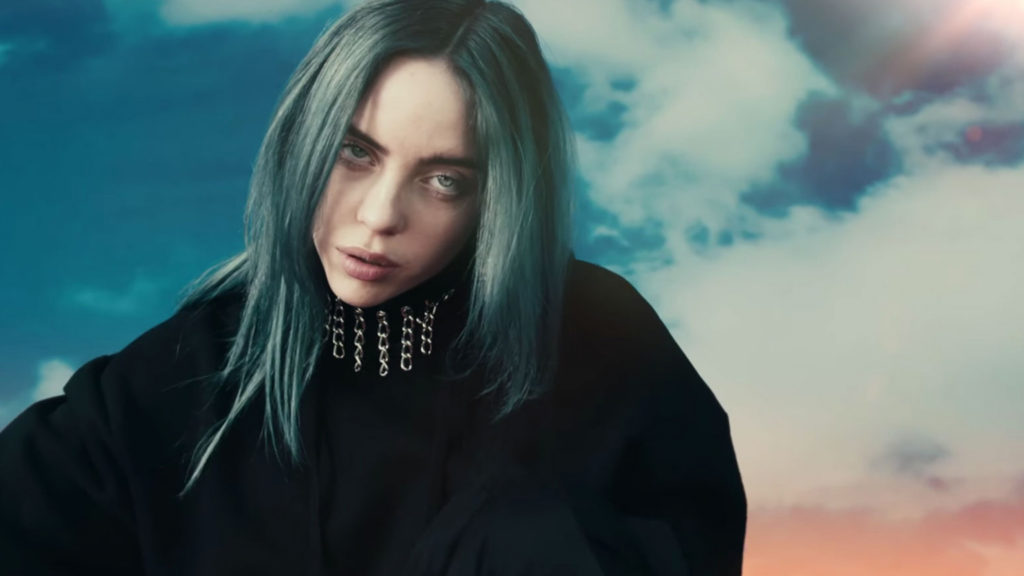
It all started with Billie Eilish’s Bad Guy.
Yes, I know. It’s a great song; it can be seen as a farce, a critique of terrible, power abusive men—up to a point. However, in the numerous interviews when Eilish has been asked what her enigmatic lyrics mean, she doesn’t get close to any analysis of what actually constructs the “bad guy” (what to me as a feminist and one who deconstructs systems of exploitation is obvious); but then, not to excuse her lack of feminist awareness, good art often goes beyond the intentions of the artist. She replies that the song “pokes fun at the way people present themselves.” Okay, if Eilish is taking the piss, it certainly isn’t obvious.
Unfortunately for inevitably impressionable girls, the main thing about the song and the super-slick video is that it’s cool. As a clever, catchy pop-song riddled with artful rock & roll ambivalence, right off the bat the ‘character’ Eilish is playing is a seamless combination of predator and prey. And, as demonstrated by the out-take laughter between Eilish and most likely her brother before the video starts, the brutality that is about to come is funny. This is rock & roll frivolity at its finest, the little snippets between songs that give ravenous fans a taste of their idol’s private life. However, what is about to come is far from funny.
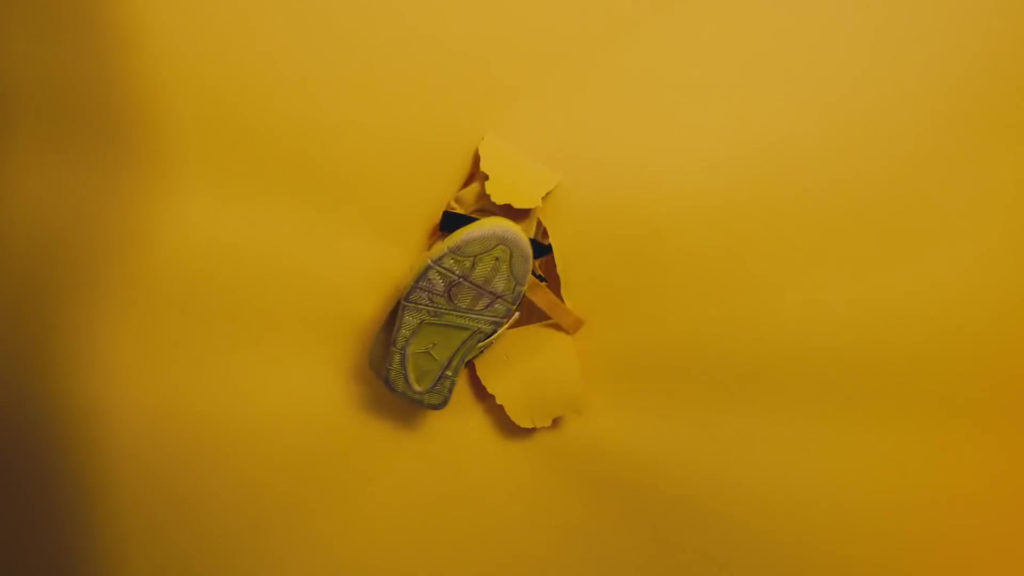
Low-fi super-cool catchy:
Eilish kicks out of mustard-yellow paper that is the same colour as her be-hoodied sweat suit both defiant and energy-sapped as she slouches sulky gangsta’ groove in the baggy suit; cut to “white shirt now red my bloody nose,” and, yes, her nose starts to bleed. I researched the nose-bleed trope and found out that it is supposed to signify sexual arousal. Tellingly, in terms of what is being communicated as young women’s sexuality in this 2019 hit, if she is sexually aroused, she looks pretty numb (and/or indifferent) to the whole thing or like she’s coming back from being raped on a date-rape drug. However, if one doesn’t know about this connection between sexuality and nose bleeds, the young woman is just plain bleeding. And what is blood typically connected to? Well, logically: violence.
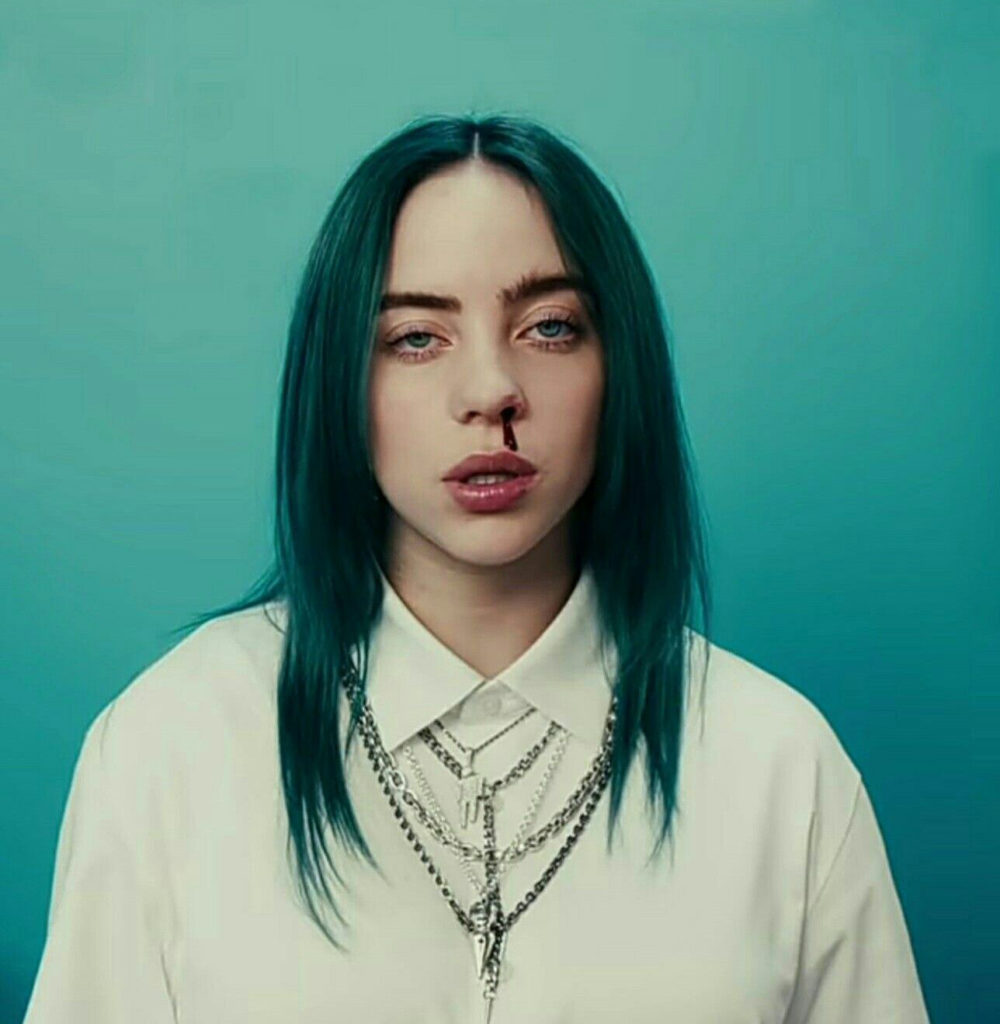
Cut from the nose-bleed:
dressed in pressed, white Bermuda shorts are little girl legs with “bruises on both my knees for you”; the bruises are red, raw, and suggest pre-bruise, recently-peeled scabs matching the fact that these bruises are ‘for you,’ as the young woman, simultaneously martyred and tough, is offering her wounds as a macabre valentine to the multiplicity of men who trail behind her on tricycles. Of course, these men are all really hot, those whom she is both victimized by and dominates while she is riding and rocking out on a bright red kiddie-car doing her soon to be very trendy manic-slouch dance as she states in super cool[3] unfeeling zombie-voice I’m the “might seduce your dad type.” (As in my last post, here comes the sensationalized Lolita trope again).
Eilish (or the non-self-character that is impossible to pull off as a rockstar in their music video because fans will always see them as the rockstar) is the epitome of the delusional empowerment so many young women think they achieve through their external and internalized hyper-sexualization[4]. Confiding: her chin is raised in male defensive/offensive defiance and/or having just received an upper-cut as eyes roll insolent and exhausted with “just can’t get enough guy.” However, despite—or perhaps because of—abuse, she states simultaneously gloating and indifferent: “I’m the bad type, make your girlfriend mad type.” Ambivalence reigns as the tough-girl/victim smears the blood from her nose-bleed all over her face.
The final shot is in a dimly lit, luxurious apartment. It isn’t hers. Not that it isn’t possible for an eighteen-year-old rockstar to own such an apartment, I think it’s safe to say it belongs to the man who is at least ten years her senior whom she is apparently dominating or is a five star hotel room paid for by him. This is another layer to the regurgitated mythology that luxury can be gained by young women using their sexuality to manipulate men. And where is Eilish (oops, I mean the character that we aren’t aware she’s playing)? Well, she’s oh-so-scandalously sitting cross-legged and cheeky as a little girl who wants to be more than spanked on of the man’s back as he does push ups (this requires her of course to be the idealized slender female of patriarchy that so many young women ferociously fight against their bodies to achieve).
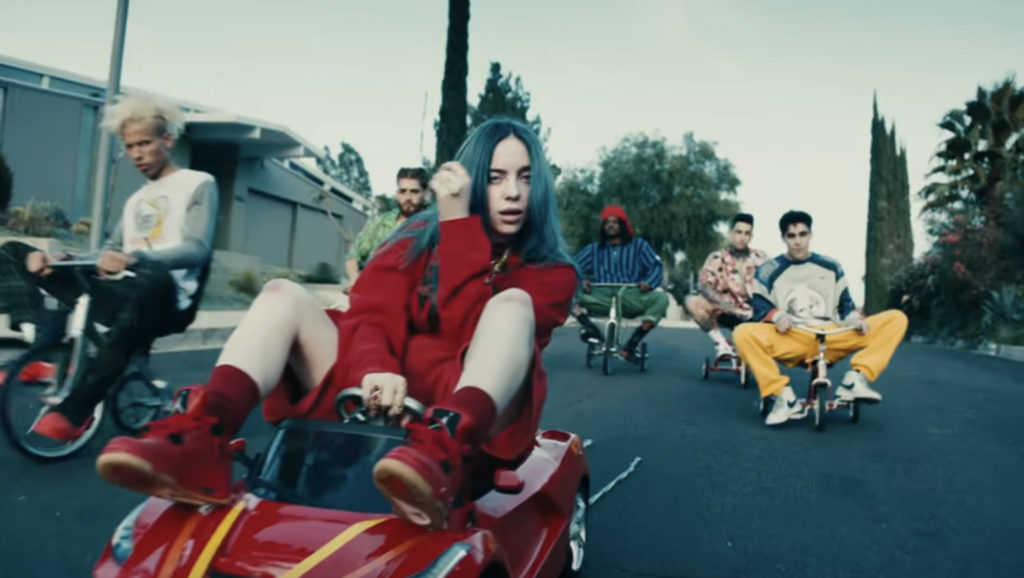
Simultaneously smug and innocent,
she states, looking as though she is about to pass out (again date rape drug comes to mind): “I like when you get mad. I guess I’m pretty glad” and then asks, “you say she’s scared of me?” (referring again to the jilted girlfriend and the all-powerful “she” existing in her sexuality as the triumphant source of the jilt). Here (another segment, yawn amidst the apparent edgy innovation, of again and again) is the message of women having so much power over men that they betray their girlfriends for us because we are such hot bad bitches; however, by aspiring towards this representation of an indifferent, emotionally shut down person, we simultaneously betray our sisters and, at the same time, this triumph is based on the fact that the men want us because we are self-victimizing and we like, even ask for, abuse. Does anyone really want to be abused even when they have been conditioned to ask for it?
I know, this is gender-politics-twisted-madness and the artful ambivalence of the song and its video swirls round and round. As an art critic, I must admit this is a riot to write about, but there is no way a pre-pubescent girl who wants to be cool will get anything out of the video except the desire—or need—to be like that. She’ll gobble up this dangerous candy; embody what will piss off her parents; be what will put her in the danger that she either doesn’t know about or doesn’t acknowledge or it’s cooler to feign indifference to or, worse yet, it doesn’t matter because putting herself in danger is the whole point: asking to be abused. This is what she’s been trained to do. In the end, this representation of a hot, insolent young woman (who is being played by a teen idol whose concerts sell out in minutes) turns young women who want to be mainstream-cool against themselves.
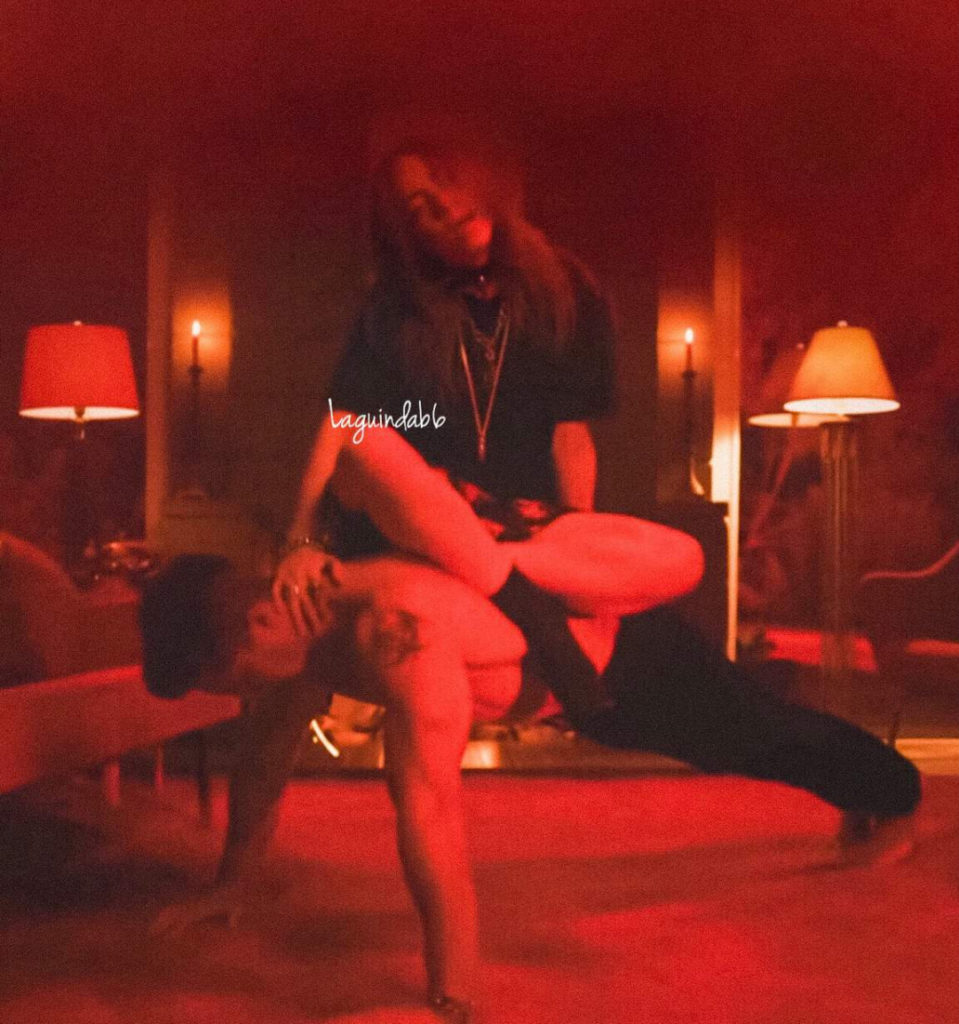
The only ‘empowered’ lyric exists in the midst of its undoing:
“I like it when you take control even if you know that you don’t own me, I’ll let you play the role. I’ll be your animal.” (Italics mine). Okay: in terms of gender politics, I get it: things are a mess in so called post-feminist so-called first world young womanhood. But, at the same time, what does this mean exactly? What does this mean in terms of young women thinking it’s cool to imitate this contradiction laden way of being a woman? Let’s unpack it, or try to:
- She says she likes being dominated and maintaining the male role of domination and the female submission. Men will continue to see themselves as dominant and women as mere things to be dominated and vessels for the enactment of their power. They will continue to dominate and often brutalize women because they are not valued fully as human. And, better yet, the women ask for it now. They have consented to being an object. She is objectifying herself.
- This he who is the paradoxically submissive ‘bad guy’ might know he doesn’t own her. Might being a key word. The consent of this role-play has not been consented to and acknowledged as play (read: not entirely real because even play contains reality). How does this play out in what it maintains beyond this apparently benign sex game? Especially when she’ll be ‘his’ animal? Isn’t the animal that she is playing that is ‘his’ but then, at the same time, not owned by him of the same body? He doesn’t own her and yet she is his. It’s titillating. Great rock & roll angst. And edgy rebellion for teenage girls to get their trying-to-figure-out-who-they-are-peer-pressured-to-be-cool-and-part-of-the-in-crowd teeth into.
By the end of the song, Eilish—or the bad-guy-girl she is attempting to be acting—is the bad guy. As her male victims’ decapitated heads hang around her in bags, any sort of empowerment in the song has simply flipped the hierarchy of power abuse: the woman is now as violent as the most violent of men to the point of achieving the indifference of a sociopath serial killer as she playfully pokes a hole in one of her victim’s head-bags. There is no empowerment here as my teenage girl friend has chastised me. This is but a sensationalized reperpetuation of that which exploits and now she, as the exploited, is the exploiter—or, in a still male supremacist culture, so she thinks.
However, in yet another interview where yet another music critic is trying to unravel her enigmatic lyrics, Eilish tries again to explain: “The initial idea for the song is like people that have to tell everybody that they are a certain way all the time? They’re not that certain way. […] In general, I feel like you will never catch a bad bitch telling everyone she’s a bad bitch. It’s on—it’s you.”[5] Okay, I don’t know about you but I only sort of understand this, and I only sort of understand this in the context of an interview and as a convoluted comment on pretension and narcissism. But as an intention readily accessible in the work of art as the ‘bad bitch’ is more glamourized than critiqued? Not so much. Or even at all.
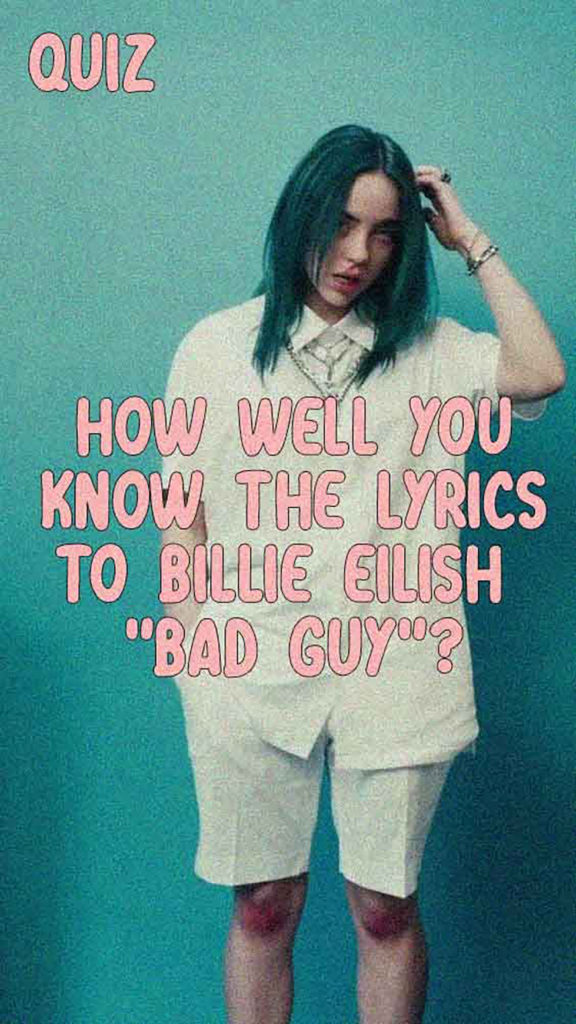
Even though we love it,
even though it is one hell of an ear-worm, I don’t think anyone got what the artist insists she was trying to do in Bad Guy—and this is most likely why so many music critics have had to keep asking her. I know the young woman I am close to didn’t. I think it’s safe to say that all of the other young women and pre-pubescent girls who strive to be cool didn’t. However, there is one almost useful revelation: beneath the unfeeling bravado performed by a bad bitch who, in the end, is the mirror image of the bad guy; through the internalized sexism that has simmered to the point of self-brutalization that pathologically produces a twenty-first century “liberated” young woman, Eilish is crouching on the sidewalk, despondently feeding pigeons (an urban pass-time that is often equated with loneliness and mental illness). Yay! I love it! An acknowledgement of vulnerability! There is a trajectory of logic here as a young woman trying to be a bad guy does quite often fail as she is abused in order to be accepted in the boys club of inherently power abusive men. And yet, again, this inevitability is washed away as the despondency becomes a decadent, stylized, first world depression, yet another act of coolness as the insolent, young woman performs being unaffected by trauma and teenage girl “Duhs” punctuate the groove.
Don’t get me wrong,
Billie Eilish is a brilliant artist and singer-songwriter. The song and its video are a pop masterpiece. However, because all artists find their inspiration in the fodder of the everyday, what does it say about our culture that this song exists in the first place? And what happens when girls imitate the very thing Eilish claims to be critiquing?
My young friend took all of Eilish’s stylized sulky, saucy slouching as real, as what she is supposed to be in order to embody coolness. And, yes, she is ‘cool.’ Hundreds of hearts on TikTok whenever she performs and posts acts of toxic, internalized sexism, but at what cost both to her personally and to reinforcing misogyny and either maintaining or increasing violence against women? Huge.
And after this early adulthood education what has she graduated to? Well, this: stay tuned for NLE Choppa “Slut Me Out.”
Yours,
LF

#iloveendnotes
[1] Karen Moe Victim: A Feminist Manifesto from a Fierce Survivor. Vigilance Press: Mexico City/Lantzville, BC: 2022: 39.
[2] Ibid: 144.
[3] I can’t help but repeat this term ‘super cool’ as it’s the main theme despite being otherwise expressed by Eilish.
[4] Read Natasha Walter Living Dolls: The Return of Sexism for numerous examples where T-shirts that say “So Many Boys, Not Enough Time,” are marketed to the parents of toddlers. 3-year-old girl maturity through young woman (even girl) sexuality
[5] https://www.nme.com/news/music/billie-eilish-breaks-down-bad-guy-lyrics-2543500
*
Note on images: all images of Billy Eilish are wallpaper free downloads except for the first and last which are screen shots from a live concert posted on YouTube.
I’m wondering what you think the solution is. Truly. Of course revolution. But barring that? Censorship? Are these not also dark forces in the spirit that need acknowledgement? Does listening to certain kinds of music always lead to definite kinds of action? Curious.
Hi Catherine
Thanks so much for your important question. Yes, solutions! There are but of course they aren’t straight ahead or easy that’s for sure. The main one being awareness and explicating, so to speak, the system that we live in. I certainly don’t think that patriarchy, misogyny, racism, and individualism (and the resultant global neo-liberal no holds barred ME and its ontology of zero empathy) are the way things always have been or always have to be; however, as a society, these highly distructive and toxic forces that construct our ‘reality’ need to be at the very least ‘noticed.’ The more people who become aware and even just notice, the more possible a real solution is (in the instance I discuss in this post that is of course related to all other exploitations) because the people will question what they are seeing (often being fed) which does affect behaviour.
A question for you: what is the connection between revolution and censorship?
No, I don’t believe in censorship up to a point. I do believe in censoring Snuf movies, child pornography and the violent hard-core porn that is the norm today and where many young people learn their sexuality (where women’s anuses are ripped and things like rose-budding). I believe these should all be illegal. The same young woman I wrote about told me that the boys all know what to do with sex becuase they learn about it watching porn on-line. Great. And they all choke all of the young women they fuck (without their consent … that’s part of the next post).
However, hard-core (the norm today as the porn producers keep one-upping each other as to levels of ‘sick’ becuase yes of course capitalism) porn aside, I believe in truly knowing what we are engaging with and being educated to have a chance to understand. Young people (pre-teen especially) don’t have the capacity to do that (ideally ‘yet’ because unfortunatly the majority of people in our culture consume without knowing what it really is). Yes, what we are exposed to especially when young not only affects but pretty much creates what we are. Unless we have someone or something to intervene and help us know what we are being fed. Ideally, it won’t take being brutalized to come to that personal awakening.
Yes, there may be dark forces in the spirit, as you say. Are you talking about an innate need to rape and murder? How are these dark forces of the spirit connected to how we are socially constructed? The young woman I am writing of and her internalized sexism is 100% socially constructed backlash. No sort of ‘natural’ dark forces going on. And the Bad Guy song. As Eilish tries to explain it, it’s not about any kind of innate darkness. I understand what you are saying as I think you are referring to other kinds of music, metal for example? I think in terms of your last question (certain kinds of music always lead to definite kinds of action), it depends on how damaged and vulnerable the person is. And their ability to know where the line is in terms of how this darkness you speak of can engulf.
A question for you, what is the connection between revolution and censorship in your opinion. What is needed is an ideological revolution. However, I don’t think we need to all out censor, we just need to get the majority of society aware of what should be censored and then they will stop consuming it. I believe it’s about teaching empathy. And empathy is impossible without awareness. Anyone who feels and knows empathy, is not going to get off on watching another person’s body and psyche being brutalized; no one who feels and knows empathy will choke a 15 year old girl while fucking her (at least without asking her first … but that’s a whole other story … Part 2 of “Follow Up. Fall Out.”